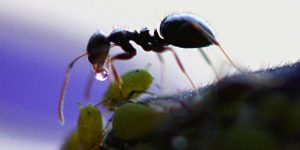Neonicotinoids Pass Through Aphids, Contaminating Honeydew and Killing off Pest Predators
(Beyond Pesticides, January 6, 2022) Seeds treated with neonicotinoid insecticides contaminate honeydew, often the biggest source of food for pest predators, according to recent research published in the journal Environmental Pollution. Concerned advocates for pollinators and pesticide reform are likely familiar with fact that neonicotinoids are systemic, and once applied to a seed or sprayed on a plant are taken up by the plant and distributed throughout the pollen, nectar and dew drops that a plant produces. But there is another systemic effect that is not included in that picture, and in monoculture crops, it could be the biggest source of carbohydrates for beneficial pest predators – honeydew. Honeydew is produced from phloem-feeding (sap sucking) pests like aphids, whiteflies, leafhoppers, and other hemipteran insects. The waste that these insects produce is liquid, and full of sugars. “This rich carbohydrate source is a common food for many beneficial insects, including pollinators, such as bees and flies, and some natural enemies of pests, such as ants, wasps and beetles,” said John Tooker, PhD, coauthor of a recent literature review published in Biological Reviews. “Honeydew often is more abundant than nectar in agroecosystems.” In 2019, a study published in the Proceedings of the … Continue reading Neonicotinoids Pass Through Aphids, Contaminating Honeydew and Killing off Pest Predators
